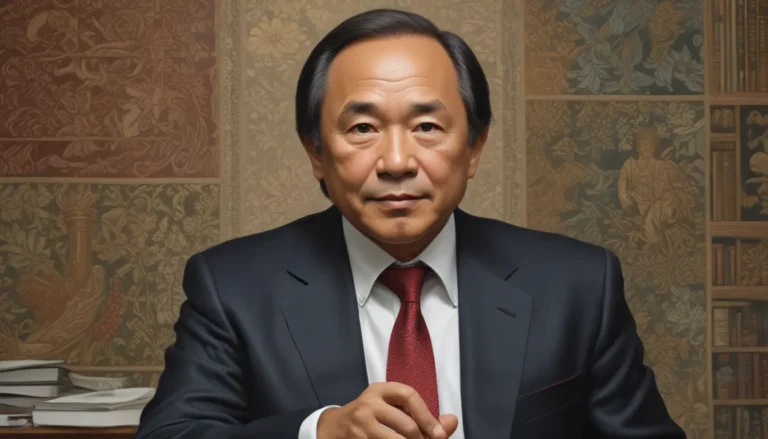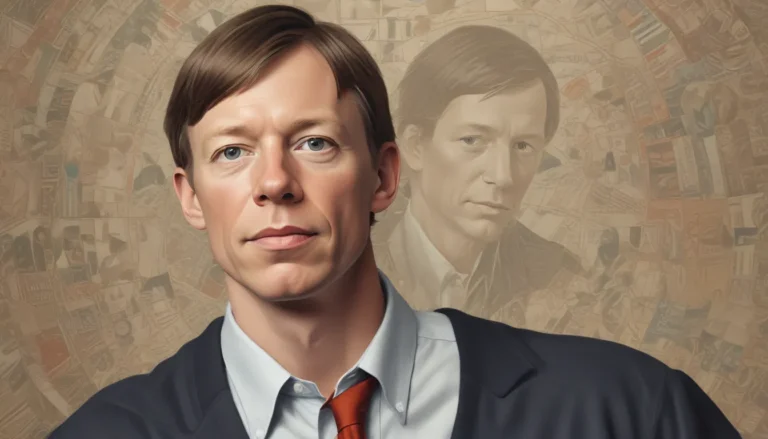The images in our articles may not match the content exactly. They are used to grab your attention, not to show the exact details in the text. The images complement the text but do not replace it.
Welcome to a journey through the fascinating life and revolutionary ideas of Gilles Deleuze, a prominent philosopher of the 20th century whose intellectual legacy continues to shape various fields such as philosophy, literature, art, and sociology. In this article, we will unravel 20 astonishing facts about Gilles Deleuze, exploring his life, his philosophical concepts, his collaborations, and his profound influence on contemporary thought. Get ready to be intrigued as we delve into the captivating world of Gilles Deleuze, shedding light on the contributions that have reshaped the philosophical landscape.
Unveiling the Genius: Gilles Deleuze’s Profound Impact
Gilles Deleuze, a distinguished philosopher born on January 18, 1925, in France, emerged as a leading figure in the realm of philosophy, offering groundbreaking ideas and a unique perspective that have greatly influenced modern philosophical thought. His collaboration with fellow philosopher Félix Guattari produced influential works such as “Anti-Oedipus” and “A Thousand Plateaus,” challenging conventional ideas and offering innovative critiques of psychoanalysis and capitalism.
The Root of Revolution: Delving into Deleuze’s Concepts
One of Deleuze’s central concepts, the rhizome, inspired by botany, revolutionized traditional hierarchical structures by emphasizing the interconnectedness and multiplicity of ideas. This concept permeated his philosophical works, inviting readers to explore a different approach to understanding complex systems and relationships.
The Cinematic Visionary: Deleuze’s Passion for Cinema
Beyond his philosophical endeavors, Deleuze harbored a deep passion for cinema, exploring the intricate relationship between film and philosophy in his influential works “Cinema 1: The Movement-Image” and “Cinema 2: The Time-Image.” This intersection of disciplines showcased his diverse intellectual pursuits and enriched his contributions to various fields.
Embracing Diversity: Deleuze’s Interdisciplinary Approach
Deleuze’s writings spanned a wide spectrum of disciplines, delving into aesthetics, literature, language, politics, and the concept of desire. His interdisciplinary approach infused richness and complexity into his philosophical ideas, offering a holistic perspective that transcended traditional boundaries.
The Academic Luminary: Deleuze’s Impact at the University of Paris
As a professor at the University of Paris, Deleuze’s lectures and teachings attracted students from around the globe, inspiring generations of scholars and thinkers. His intellectual legacy continues to shape the academic landscape, fostering critical inquiry and stimulating new avenues of thought.
Diving into Transformation: Deleuze’s Concept of Becoming
A fundamental tenet of Deleuze’s philosophy is the notion of becoming, emphasizing the process of change and transformation over static states of being. This dynamic perspective challenged conventional definitions and encouraged a fluid and evolving understanding of existence.
Redefining Identity: Deleuze’s “Body without Organs”
The concept of the “Body without Organs,” proposed by Deleuze and Guattari, disrupted traditional notions of identity by introducing a multiplicity of intensities and connections that defy categorization. This revolutionary concept challenged established norms and offered a fresh perspective on the complexities of embodiment.
Drawing Inspiration: Deleuze’s Philosophical Influences
Deleuze drew inspiration from a myriad of philosophers, with the works of Nietzsche and Spinoza playing a particularly influential role in shaping his philosophical framework. These thinkers contributed to the evolution of Deleuze’s ideas, infusing his concepts with depth and complexity.
Embracing the Unfamiliar: Deleuze’s Notion of “Difference”
At the core of Deleuze’s philosophy lies the notion of “difference” as a productive force that disrupts binary oppositions and opens new possibilities. This concept has reverberated across fields such as post-structuralism and cultural studies, challenging established modes of thought and encouraging innovation.
Exploring Affectivity: Deleuze and the Concept of Affect
Delving into the realm of affect, Deleuze explored the ways in which affectivity shapes our experiences and relationships. His nuanced analysis of emotions challenged traditional understandings, paving the way for novel interpretations of affective processes and their impact on human interactions.
The Activist Philosopher: Deleuze’s Engagement with Social Change
Beyond his scholarly pursuits, Deleuze actively participated in political and social movements, advocating for collective action and social transformation. His commitment to activism reflected a belief in the power of community and the potential for positive change through collective endeavors.
The Artistic Wordsmith: Deleuze’s Innovative Writing Style
Deleuze’s philosophical writings are renowned for their distinctively creative and unconventional use of language, challenging traditional forms of expression and inviting readers to engage with complex ideas in new ways. His unique writing style exemplifies his intellectual creativity and innovative approach to communication.
Beyond Philosophy: Deleuze’s Influence on Diverse Fields
The impact of Deleuze’s philosophy extends far beyond the confines of philosophical discourse, permeating fields such as cultural studies, film theory, art, literature, and architecture. His concepts and theories have inspired new perspectives and enriched various disciplines, leaving an indelible mark on intellectual thought.
Embracing the Virtual: Deleuze’s Conceptual Realm
Deleuze’s concept of the virtual encompasses a realm of potentiality and becoming that coexists with the actual, shaping our experiences and realities. This dynamic force challenges traditional notions of reality, emphasizing the continuous interaction between the virtual and the actual in shaping our perceptions.
Collaborative Endeavors: Deleuze and Guattari’s Joint Works
Many of Deleuze’s groundbreaking writings were produced in collaboration with Guattari, resulting in seminal works that merged their distinct ideas to create a unique philosophical perspective. These collaborative endeavors have enriched contemporary philosophy and propelled innovative thinking in diverse spheres.
Unraveling Complexity: Deleuze’s Intensive Multiplicities
Deleuze’s exploration of intensive multiplicities delves into the intricate networks of relations within systems, challenging simplistic understandings of identity and highlighting the interconnectedness of diverse elements. This concept underscores the complexity and dynamism inherent in various contexts.
The Power of Creation: Deleuze’s Emphasis on New Concepts
Deleuze advocated for the constant creation of new concepts as a means to break free from the constraints of established modes of thought. Viewing conceptualization as a form of resistance and creativity, he urged individuals to challenge conventional wisdom and embrace innovative ways of thinking.
Embracing Fluidity: Deleuze’s Rejection of Fixed Selfhood
Rejecting the notion of a fixed, essential self, Deleuze emphasized the fluidity and transformative potential of individual and collective experiences. His philosophy encouraged individuals to embrace change, complexity, and the ever-evolving nature of existence.
The Enduring Legacy: Gilles Deleuze’s Influence on Philosophy
Gilles Deleuze’s profound ideas and lasting contributions have solidified his position as a transformative figure in the history of philosophy. His intellectual legacy continues to resonate in contemporary discourse, inspiring scholars, thinkers, and artists worldwide to engage with his revolutionary concepts and explore new frontiers of thought.
Frequently Asked Questions
-
Who was Gilles Deleuze?
Gilles Deleuze was a French philosopher whose groundbreaking ideas and revolutionary concepts have left a profound impact on various fields, reshaping contemporary philosophical discourse. -
What are some of Gilles Deleuze’s key concepts?
Key concepts in Deleuze’s philosophy include the rhizome, becoming, and the virtual, each challenging traditional modes of thought and offering innovative perspectives on the complexities of the world. -
How has Gilles Deleuze influenced modern philosophy?
Gilles Deleuze’s influence on modern philosophy is significant, inspiring scholars and intellectuals to question established norms, embrace diversity, and explore non-linear paths of thought that reshape the intellectual landscape. -
What is the significance of Deleuze’s concept of becoming?
Deleuze’s concept of becoming underscores the fluidity and constant state of transformation in the world, urging individuals to embrace change, challenge fixed identities, and unlock new possibilities for personal and social evolution. -
How can I delve deeper into Gilles Deleuze’s work?
For those interested in exploring Gilles Deleuze’s ideas further, a wealth of books and articles delve into his philosophical concepts, offering profound insights into his unique perspective on the complexities of human existence and the world at large.
Don’t Miss Out: Explore More Fascinating Insights
Gilles Deleuze’s astonishing life and groundbreaking ideas continue to captivate philosophers worldwide, inviting readers to delve deeper into the complexities of his philosophical framework. By embracing his revolutionary concepts and challenging established norms, individuals can embark on a transformative intellectual journey that transcends conventional boundaries and opens new horizons of thought. For more captivating insights into the minds behind these innovative ideas, explore the intriguing facts about Deleuze’s profound influence and enduring legacy in the realm of contemporary philosophy.






